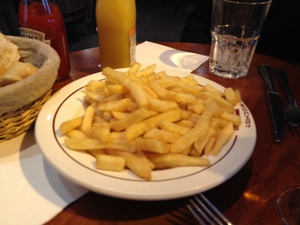Benjamin Franklin and I came to the same conclusion about “French” fries after visiting France.
 Franklin, the first United States envoy to France in the 1770s, discovered pommes frit (fried potatoes) at a dinner hosted by a French pharmacist who made a habit of serving potatoes up to 20 different ways at dinners for dignitaries to promote potatoes as a food for people. Potatoes, native to South America, had only been used for feeding livestock until his campaign sought to popularize them as nutritious food for humans. Franklin carried home the good news about potatoes, especially fried potatoes.
Franklin, the first United States envoy to France in the 1770s, discovered pommes frit (fried potatoes) at a dinner hosted by a French pharmacist who made a habit of serving potatoes up to 20 different ways at dinners for dignitaries to promote potatoes as a food for people. Potatoes, native to South America, had only been used for feeding livestock until his campaign sought to popularize them as nutritious food for humans. Franklin carried home the good news about potatoes, especially fried potatoes.
When Thomas Jefferson succeeded Franklin as a diplomat to France, he also experienced fried potatoes “in the French manner.” After becoming President, Jefferson included fried potatoes on the menu for a White House dinner in 1802. They weren’t popularized for over a hundred years; however, until around 1918 when American soldiers serving in France during World War I came home clamoring for “French fries.”
Even though Americans have been preparing French fries on a rather large scale — to the tune of about about 29 pounds per person annually — American fries are not as good as those my friend Marsha and I ate on our recent trip to Paris. We agreed that if American fries were as good as what we ate there, we would be putting on weight. I don’t know if it is the oil they use or the potatoes themselves that make them taste better. Even with over two hundred years of experience, we do not seem to be able to produce a fry that so perfectly tastes like potato with only subtle hints of oil and salt.
I mentioned my preference for French prepared fries to a local restaurant owner. He noted that fries probably tasted better in the United States in the past when each order was prepared as it was ordered, rather than being prepared ahead in baskets that sit until the fries are served. Or is the difference related to using frozen potatoes instead of fresh potatoes?
The method of frying might also be different. While in Paris, I bought a copy of The Alice B. Tolkas Cookbook. Alice was Gertrude Stein’s partner, and although they were both Americans, they lived in France for most of their lives. Gertrude wrote, Alice cooked, and together they entertained some of the greatest artists and writers of the early 20th century, including Picasso, F. Scott Fitzgerald and Ernest Hemingway. Alice’s cookbook includes “The Real Right Way For French Fried Potatoes,” which calls for a second quick plunge into the fat, and then “sprinkle with salt and serve at once.” Alice was a stickler for serving food hot. Her cookbook is part memoir and contains many great anecdotes about their life in France, which spanned both World Wars.
Advocating consumption of fried potatoes is probably not going to be well received at a time when obesity and diabetes are on the rise in the United States, but Marsha and I didn’t see very many overweight Parisians, which boggles my mind given how wonderful the food is. I haven’t even mentioned the pain au chocolat (chocolate croissants). I don’t know what their secret is, but it is worth investigating. We all would probably like to eat and drink like they do. Remember they are the ones who believe that red wine is good for us.
It is fun to think of Benjamin Franklin, Thomas Jefferson, and American WWI soldiers preceding Marsha and me in discovering “potatoes fried in the French manner.”
Some information for this blog was found in The Christian Science Monitor ( 2 May 2000) <http://www.csmonitor.com/2000/0502/p18s1.html>. Here is a link to information on The Alice B. Tolkas Cookbook (1994) <http://www.serifbooks.co.uk/books/cookery/?book=18>.